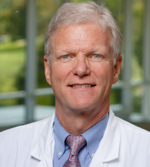A COVID-19 Conversation
Bruce H. Campbell, MD
A patient gets his news from different sources than does Dr. Campbell…
When the cancer recurred after the first operation, I suggested that he see one of the radiation oncologists to hear what she might have to offer. “No way. I had a terrible experience last time,” he said at the time. “Even if you recommend radiation after this next operation, I’ll say ‘no’ again. End of conversation.” So, we returned to the operating room for more surgery.
Now, a few weeks later, he is back in the office. I wear my mask and have him lower his so I can examine his mouth and throat. I am relieved. So far, so good. We review his CT scan. “The exam and the scan are both fine. No signs of cancer. Great news!” I say. “All is well.”
He nods and tugs up his mask again. “Good, good.” Then, he cocks his head and looks at me. “So, do you mind if I ask you a couple of questions?”
“Sure,” I say, although I’m not sure where this is heading. “Fire away.”
He glances toward his wife and then back to me. “What do you think of this coronavirus?"
I tense a bit. Based on his previous comments, I know precisely where he stands on the political spectrum. Uh, oh, I think to myself. His favorite media outlets are known for skepticism about wearing masks and maintaining social distancing. Nevertheless, he seems to be genuinely interested.
“Well,” I respond, “It’s dangerous. Based on the science, we should be very cautious. There’s too much risk of the virus spreading and people dying needlessly.” There, I hope. Maybe that’s that.
He starts down his list. “Yeah, but just in other places, right? I hear it’s not bad in Milwaukee.” In fact, our hospital doesn’t publish admission and ICU data, but I am able to tell him in general terms that the numbers of patients admitted and seriously ill with COVID-19 has been climbing over the past several days. “Really?” he asks. “I’m surprised.”
“It’s real,” I say.
“Well then, what do you think about these things I heard on the news?” I cringe slightly as he proceeds through the series of narratives that have found life on the internet. I try to keep up. No, COVID-19 is not like a “regular” flu. Yes, people are dying, and some who recover stay sick for a long time. It’s true that people don’t have to appear ill to be infectious. No, there is no evidence that it was a biological weapon developed in a Chinese lab. No, I’m not aware of any studies that show that more people will die of a stalled economy. No, I don’t believe that it will fade over the coming months and magically disappear after the presidential election. The best studies show that hydroxychloroquine does not extend hospitalized patients’ lives. Yes, masks, hand washing, socialdistancing, and staying home are the best ways to slow the spread. Yes, vaccines will be the best way to return to “normal” and they will take a long time to develop. No, I’m not surprised that Dr. Fauci and the other health experts change their recommendations from time-to-time since scientific evidence continues to evolve. I don’t believe that there is a “scientific deep state.” We go down his list and I do my best to address each concern.
I tell him what I know of the 1918 Flu Pandemic and how the “second wave” killed more than the first. Bringing it closer to home, I share how construction of some of our hospital buildings, which are on part of the old Milwaukee County Grounds, required the exhumation, study, and re-interment of more than two thousand people buried between 1882 and 1925, including many who died and were haphazardly buried anonymously during epidemics. It can happen again.
“Tamping down the virus is personal,” I tell him. “Two of my four children work in healthcare. I’m over sixty. We are all at risk and wearing a mask is the most gracious thing anyone can do,” I say. “It’s a gift we give to others.”
After a deep breath, I realize, gratefully, that they are both still engaged. They have asked honest questions and I have done my best to respond. I have discovered how challenging it is to encapsulate evolving science into respectful, careful, honest, and evidence-based answers for people who might not be inclined to believe people like me. On topics where there are knowledge gaps or shifting data, I see why they might be skeptical.
This is the first meaningful face-to-face conversation I have had with people who spend their days gathering news from sources other than the ones I peruse, and it differs from conversations on Facebook with folks that already agree with me. I am grateful they listened and appreciate the opportunity to better understand their perspectives, even if just for a moment.
“Thanks, Doc,” he says finally. “You gave us some things to think about. I don’t need to come back for a recheck, do I?”
“Well, I would like to see you again in a few months, but I would be happy to see you anytime. Call if anything changes, okay? I know you will.”
“You got it.” We all bump elbows and they stand to leave. “Oh, yeah. And doesn’t abortion kill more people than COVID-19?”
“Oh, look at the time! Really good to see you both,” I say. I sense our conversation will continue.
Bruce H Campbell, MD FACS is a Professor of Otolaryngology and Communication Sciences and Associate Director of the MCW Medical Humanities Program. He is a member of the Faculty Pillar of the Robert D. and Patricia E. Kern Institute for the Transformation of Medical Education. He serves as Editor of the Kern Transformational Times newsletter.





